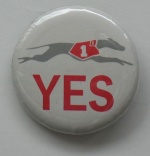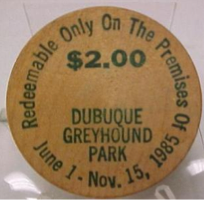Encyclopedia Dubuque
"Encyclopedia Dubuque is the online authority for all things Dubuque, written by the people who know the city best.”
Marshall Cohen—researcher and producer, CNN
Affiliated with the Local History Network of the State Historical Society of Iowa, and the Iowa Museum Association.
DUBUQUE GREYHOUND PARK AND CASINO: Difference between revisions
No edit summary |
No edit summary |
||
| Line 44: | Line 44: | ||
As 2014 ended, the Iowa Greyhound Association announced that it would not be offering simulcasting in January and February, 2015. Simulcasting would resume on March 6, 2015 with live racing expected to begin in early April. (7) | As 2014 ended, the Iowa Greyhound Association announced that it would not be offering simulcasting in January and February, 2015. Simulcasting would resume on March 6, 2015 with live racing expected to begin in early April. (7) | ||
In February 2015 Dubuque government officials announced that the city would be facing a second year of a multi-million budget deficit. City Manager [[VAN MILLIGAN, Michael|Michael VAN MILLIGAN]] stated that the city had lost nearly $24 million over the past eight years because of declining gaming revenues. (8) The trend was expected to continue. To fight the shortfall, the manager recommended employment cuts and fee increases including a 173% increase in fees to landlords. (9) | |||
[[Image:wndghp.png|left|thumb|250px|]] | [[Image:wndghp.png|left|thumb|250px|]] | ||
| Line 67: | Line 69: | ||
7. Jacobson, Ben. "Simulcast Racing to Go on Hiatus," ''Telegraph Herald'', December 31, 2014, p. 1A | 7. Jacobson, Ben. "Simulcast Racing to Go on Hiatus," ''Telegraph Herald'', December 31, 2014, p. 1A | ||
8. "Dubuque Faces Mult-Million Dollar Deficit," KWWL Online, February 17, 2015 | |||
9. Ibid. | |||
Dubuque Greyhound Park and Casino, http://cicotello.com/Pictures%20and%20Information/USA/States/Iowa/Cities/D-L/Dubuque/Dubuque%20Greyhound%20Park%20&%20Casino/Dubuque%20Greyhound%20Park%20and%20Casino.htm | Dubuque Greyhound Park and Casino, http://cicotello.com/Pictures%20and%20Information/USA/States/Iowa/Cities/D-L/Dubuque/Dubuque%20Greyhound%20Park%20&%20Casino/Dubuque%20Greyhound%20Park%20and%20Casino.htm | ||
Revision as of 04:33, 24 February 2015
DUBUQUE GREYHOUND PARK AND CASINO. Opening on June 1, 1985, Dubuque Greyhound Park became the nation’s first nonprofit greyhound track. The facility was owned by the City of Dubuque and is run under the guidance of the DUBUQUE RACING ASSOCIATION, a volunteer board comprised of 21 directors. Profits from the race track went to the City and area charitable organizations, and pari-mutuel and gaming taxes provided revenue for the city, county, and state.
In 1984, the Iowa State Legislature passed the Pari-mutuel Wagering Act which opened Iowa to greyhound and horse racing. At the same time that the legislation was being discussed, a Dubuque group formed to assess the potential for a racetrack in the community. Originally a part of the Chamber of Commerce Convention and Visitors Bureau, the group became independent and incorporated as the DUBUQUE RACING ASSOCIATION. With its membership designed to include persons representing a broad base of local interest, the organization drafted bylaws that mandated a nonprofit status, and included a rule to ensure that no member would receive compensation or personal benefit from the development of a racetrack.
After the group completed an extensive feasibility study, the prospect of a greyhound racetrack in Dubuque was taken to the voters. An April 1984 referendum asked the citizenry to approve a $7.9-million general-obligation bond to be used as the major source of funding for the racetrack. The general-obligation bond would place the burden of the responsibility for the track’s success upon the citizens themselves. A successful track would mean a new source of city revenue; a failure would ensure an automatic increase in property taxes.
On April 24, 1984, Dubuque voters overwhelmingly approved a $6.5 million bond referendum for the construction of a greyhound-racing track. With 60 percent needed for passage, the measure received a stunning 71 percent approval with 11,959 voting for and 4,992 opposed to the project. The referendum was the largest in Dubuque history.
Following the successful vote, track officials were faced with filing the application for Dubuque's racing license. Hundreds of pages long and over one-inch thick, the document was hand delivered by Terry HARRMANN and Arnold N. HONKAMP to the offices of the Iowa Racing Commission in Des Moines to meet the June 1 deadline.
The Commission spent six weeks studying eastern Iowa applications from Cedar Rapids (which also sought a horse-racing license), Dubuque, and Waterloo. The announcement that Dubuque would receive the first license came on July 18, 1984. One week later the Commission awarded Dubuque the lucrative summer racing schedule.
Groundbreaking ceremonies were held in late August, putting the facility on a rapid nine-month construction schedule. With a target opening date of June 1, 1985, the first construction contract was awarded by the City Council on July 30, 1984. Two weeks later the Council received the shocking news that construction costs had soared from $8 million to $10.1 million resulting in the City needing to borrow an additional $1.4 million in bonds. During the fall of 1984, the Dubuque Racing Association named the Dubuque track and hired Roy Berger as general manager. Berger, then the general manager of a track in Tucson, Arizona, was the youngest dog track manager in the United States.
Surpassing Job Service of Iowa estimates of 4,000, a total of 5,750 people applied for three hundred track jobs in April 1985. The first greyhounds began training at the facility on May 7.
On June 1, 1985, Dubuque Greyhound Park opened its doors for the first time.
In May of 1991, Dubuque Racing Association prepaid the remaining $ 2.7 million of the original $7.9-million in general-obligation bonds used to finance the construction of Dubuque Greyhound Park, some 14 years ahead of schedule, thus making Dubuque Greyhound Park the first debt-free pari-mutuel facility in the state of Iowa. Dubuque Greyhound Park's first contributions to the City of Dubuque and tri-state charities totaled $600,000 of which the city's share was $450,000.
Despite the poor performance and then closing of three of Iowa's riverboats in 1992, legislation to relax gambling regulation repeatedly failed. Riverboat gambling according to many had been successful in promoting tourism and was never intended to become an industry. Despite setbacks, pressure continued from riverboat owners to lift betting/loss limits and space restrictions. These people were joined by parimutuel racetrack owners who wanted slot machines and even Iowans who favored less restriction. Concerns about the effects of gambling eventually led the Iowa House to only approve the new legislation by a 51-49 vote. Before gambling laws could be eased, local approval was required in counties where riverboats and racetracks were operated. This occurred in May 1994.
Racetracks benefited from the new legislation. Racetracks were permitted to have slot machines and operate 24 hours daily--the legislature later allowed table games as well--as long as the tracks subsidized dog and horse racing from casino revenues. (1) In 1996 the total parimutuel revenue at Iowa three tracks was $18.8 million. Slot machine revenue, however, for the same period was $257.6 million.
In the first year, local slot machine revenue far exceeded projections. In 1996, the machines brought in over $20 million in adjusted gross receipts (the amount wagered minus winnings paid) well above the estimated earnings of $12 million. The state received close to $3.5 million in gaming and admission taxes with the City of Dubuque and Dubuque County each receiving more than $100,000 in taxes.
The City of Dubuque also received an estimated $1.5 million in lease payments from the racing association, equal to one-half percent of the coins put into the machines. These figures did not include the distribution the racing association made at the end of its fiscal year. The distribution, from excess revenue, was divided with half going to the city, one-quarter to charity, and one-quarter to a racing association reserve fund.
During the 1996 racing reason, employment reached an estimated 340 people with a $4.4 million payroll. The casino generated over $1 million in pursue money for greyhounds.
In February 2009. Dubuque Greyhound Park and Casino announced that it would be changing its name to Mystique. The change in name was part of a $10 million overhaul to help the facility compete with the larger DIAMOND JO CASINO. Mystique would offer 1,000 slots, 18 tables, a poker room and dog track. New offerings included Champagne, a new steak house; Bon Appetit, a buffet; Encore, a stage for live entertainment; The Cabaret at Mystique, an entertainment venue; and the Rendezvous Bar.
In December, 2013 the member of the Dubuque City Council announced that they would formally ask state legislators to remove the greyhound dog racing requirement from the Mystique Casino. Where greyhound racing in 1985 had aided the city in its economic recovery, the industry had become a cost. Net income at the track peaked at $2,738,093 in 1988, but fell into a deficit in 1992 and never recovered. In a gag order included in a contract with greyhound kennel owners prevented officials from lobbying against the industry for five years. (2) That agreement not to lobby was renewed in 2011. (3) In 2012 the Dubuque Racing Association had spent nearly $4.5 million to subsidize racing. The DRA had diverted over $55 million from charitable organizations and the city's capital projects fund over the last thirty years. (4) In 2013 only two dog tracks remained in Iowa.
In May 2014 Governor Terry Branstad signed into law a measure that allowed Mystique Casino, operated by the nonprofit Dubuque Racing Association, to ease out of greyhound racing operations at the end of 2014 but allowed an industry group to continue races at the track. Under the new law, Mystique Casino paid a $7 million settlement over seven years to the greyhound industry. The Iowa Greyhound Association had the opportunity to lease the track and operate races starting in 2015. (5)
The gambling industry in Dubuque witnessed another year-over-year decline in revenue from 2013-2014. Revenue at Mystique fell by 14.8% while the Diamond Jo experienced a 14.1 percent decline. The decline in Dubuque was less than for casinos in Iowa generally which saw a 6% decrease. Decreases were higher in markets close to Illinois and Wisconsin. (6)
As 2014 ended, the Iowa Greyhound Association announced that it would not be offering simulcasting in January and February, 2015. Simulcasting would resume on March 6, 2015 with live racing expected to begin in early April. (7)
In February 2015 Dubuque government officials announced that the city would be facing a second year of a multi-million budget deficit. City Manager Michael VAN MILLIGAN stated that the city had lost nearly $24 million over the past eight years because of declining gaming revenues. (8) The trend was expected to continue. To fight the shortfall, the manager recommended employment cuts and fee increases including a 173% increase in fees to landlords. (9)
See: MYSTIQUE COMMUNITY ICE CENTER
---
Source:
1. Murphy, Erin and Jacobson, Ben. "On Their Last Leg?" Telegraph Herald, March 23, 2014, p. 2
2. Ibid.
3. Ibid.
4. Jacobson, Ben. "City: Greyhound Racing Can Go," Telegraph Herald, December 6, 2013, p. 1
5. Murphy, Erin. "Branstad OKs Greyhound Plan," Telegraph Herald, May 31, 2014, p. 1
6. Montgomery, Jeff. "Dubuque Gaming Industry Takes 14% Hit," Telegraph Herald, July 16, 2014, p. 3A
7. Jacobson, Ben. "Simulcast Racing to Go on Hiatus," Telegraph Herald, December 31, 2014, p. 1A
8. "Dubuque Faces Mult-Million Dollar Deficit," KWWL Online, February 17, 2015
9. Ibid.
Dubuque Greyhound Park and Casino, http://cicotello.com/Pictures%20and%20Information/USA/States/Iowa/Cities/D-L/Dubuque/Dubuque%20Greyhound%20Park%20&%20Casino/Dubuque%20Greyhound%20Park%20and%20Casino.htm
Nichols, Mark W. "History and Deregulation of Riverboat Gambling in Iowa and Illinois," Journal of Gambling Studies, online:www.business.unr.edu/faculty/.../cross%20border%20substitution.pdf











